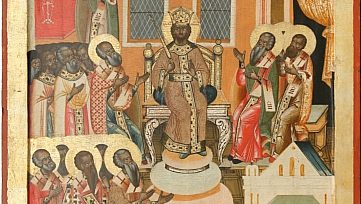Later this month, Pope Leo XIV will visit the ancient city of Nicea, now known as Iznik, in Turkey. The occasion is to mark the 1,700th anniversary of the Council of Nicea, a gathering of bishops that established the truth about Jesus and gave us the creed that we still recite in every Sunday Mass.
From the Latin credo, meaning “I believe,” the creed is the official summary of what we believe as Catholics.
In the early Church, long before there were printed copies of the Gospels, preachers, teachers, and ordinary believers needed a way to profess and share their beliefs. The various creeds and “rules of faith” gave them a common language.
This language comes from the apostles, who often used short summary statements in their teaching. St. Paul, for example, writes to the Corinthians: “Christ died for our sins … he was buried … he was raised on the third day in accordance with the scriptures.”
Today candidates for baptism still profess their faith using these words. During the Easter Vigil, they renounce Satan and affirm each article of the creed in response to the priest’s questions, a practice that dates back to the first Easter celebrations.
We learn these articles of faith by heart beginning in childhood. But as the Catechism tells us: “We do not believe in formulae, but in those realities they express, which faith allows us to touch.”
Our faith is not an agreement with a set of ideas. The creed is more like a prayer that connects us with a divine Person, drawing us deeper into the mystery of Jesus, who calls us to know him, to love him, and to change our lives to be like him.
The creed is a summary of what Jesus taught and revealed — about himself, about God, about the Spirit, about human nature and human destiny, about the Church and heaven.
But it is more than that. These beliefs shape how we see the world and understand God’s expectations for our lives; these beliefs change our priorities and form our actions; they give substance to what we hope for.
When we say there is only one God who made everything in heaven and earth, we confess our belief in his providence. We believe he is in charge of his creation, that he holds our lives in his hand, that he is at work in society and in the events of history.
When we say this God is our Father, we recognize that we are more than mere creatures. We are in truth God’s children, and his desires for us are a Father’s desires, he wants only what is good for us, he wants only that we find love and happiness.
We profess that the Son of God was “begotten, not made, consubstantial with the Father.” This odd word “consubstantial,” homoousion in Greek, is the only word in the creed not taken from the Scriptures.
The bishops at Nicea chose this word to tell us an essential truth — that Jesus shares the same nature as the Father. And because he is “true God and true man,” he can enter his creation and transform our humanity, making us sharers in his divine nature.
As St. Athanasius, one of the heroic bishops of Nicea, explained: “For the Son of God became man so that we might become God.”
This is the deep meaning of the salvation that Jesus came down from heaven to bring us.
When we say he suffered and died “for our sake,” we recognize that our lives are part of the divine plan; we understand how precious we are to God. Jesus’ love becomes the reason for everything we do.
In the creed we affirm that we live now by the Holy Spirit, who gives us new life at baptism, brings about the forgiveness of our sins, and makes us children of God.
We walk now by the light of the Spirit, following the way of Jesus, living as one family in his Catholic Church, looking forward to the day when he will fulfill all his promises, in “the resurrection of the dead and the life of the world to come.”
Our Catholic faith is thrilling. We should feel the excitement every time we pray the creed. We are part of the wonder of creation, loved by a God who becomes one of us so that we can share our lives with him forever.
Pray for me and I will pray for you.
And let us ask the intercession of the Virgin Mary, in whom Our Lord was “incarnate … and became man.” May she help us to rediscover her Son in the creed and grow in our desire to live the good and beautiful life that he taught us.

